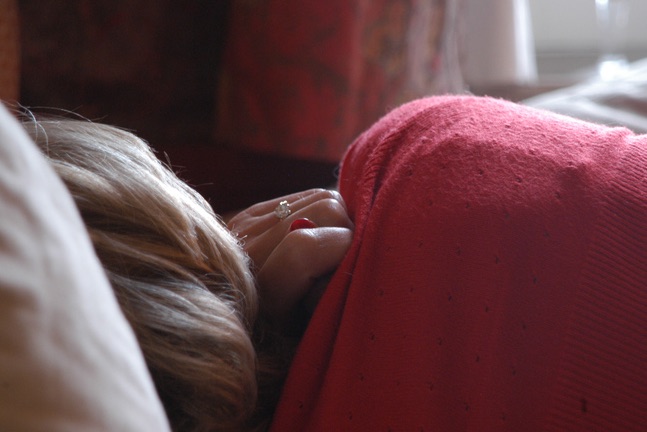
By Dr. Meagan Knowles | Psychologist
Sleep is a necessary part of our mental and physical well-being. Yet, almost 40 million Americans suffer from sleep disorders each year. Though everyone’s sleep needs vary, the average amount of sleep a person should get depends on their age.
Many Americans report getting an average of six hours of sleep per night, indicating sleep deprivation. Research has shown that it is not only the quantity of sleep that is important, but the quality. Even if you are in bed for eight hours, if you have difficulty falling asleep, disrupted sleep during the night, or early morning awakening, you are not getting quality sleep. Lack of sleep decreases learning, attention, alertness, problem-solving abilities, reaction time, motivation, and our ability to cope with difficult emotions. Poor sleep has also been linked to increased anger, irritability, impulsivity, anxiety, depression, and risk-taking behaviors.
Stress is reported as the number one cause of sleeping difficulties. Common triggers include school or job related stress, financial difficulties, family problems, relationship issues, and serious illness in the family. Jobs that require shifting work schedules or a significant amount of travel can make it difficult to keep a consistent sleep schedule. When our sleep is not consistent, our biological or circadian rhythm can be disrupted. It’s important to keep consistent sleep schedules and decrease stress.
The following strategies are recommended to get better sleep:
- Keep a regular sleep schedule. Even on the weekends, try to go to bed at the same time and get up around the same time. Going to bed later or sleeping in can cause your circadian rhythm to be disrupted.
- Create a bedtime routine. Begin getting ready for bed around the same time and keep your nightly routines in the same order (e.g., put your pajamas on, then brush your teeth, then wash your face). Your body will naturally become more tired once you begin your routine.
- Don’t eat heavy meals before sleep. Eating before bed can cause acid reflex or stomach discomfort. Gravity also helps with digestion, therefore, it’s more difficult for us to digest food while lying down. If you need a snack before bed, eat carbohydrates or proteins to promote sleepiness.
- Don’t drink caffeine six hours before bed. Caffeine is a stimulant, which will keep your body awake and alert. People who drink caffeine a few hours before bed take longer to fall asleep and lose an average of 1-3 hours of sleep per night.
- Avoid alcohol before bed. Though alcohol can make you drowsy and fall asleep faster, it disrupts sleep throughout the night. Alcohol can also keep you from entering into the later stages of sleep when deep sleep occurs. Though you may spend plenty of hours sleeping, you can awake feeling tired and drowsy.
- Avoid smoking before bed. As with caffeine, nicotine is a stimulant, which can keep you from falling asleep. Smokers have been found to have less slow wave sleep, or deep sleep. As with alcohol, you may awake feeling tired despite having slept for plenty of time.
- Get regular exercise. Moderately intense aerobic exercise (e.g., walking) has been found to increase sleep quality and decrease the amount of time it takes to fall asleep. Avoid intense exercise a few hours before bed. Vigorous exercise increases heart rate, body temperature, and adrenaline which keeps your body alert and active. A minimum of 20 minutes of moderately intense exercise has shown to help increase sleep satisfaction.
- Remove distractions. Decrease noise, lights, and extreme temperatures. Our brains continue to be active during sleep, meaning we continue to interpret information such as sounds. Monotonous noise, such as white noise, can help drown out extraneous noises that might disrupt our sleep. Light is an important factor that affects our natural sleep cycle. Getting more light during the day can help regulate the sleep cycle. It’s important to get light by walking outside periodically, turning on bright lights, or using light therapy light bulbs. In terms of temperature, it’s important to keep your room cool at night, but not too cool. Our body’s temperature naturally decreases at night and having a cool room helps the body achieve this temperature and induce sleep.
- Decrease activities with a backlight. Most screens have LED backlights which emit blue-light wavelengths. This type of light exposure suppresses melatonin levels and stimulates activity in the brain. Limiting the amount of time on your phone, computer, or electronic device during the hour before bedtime can decrease the amount of time it takes to fall asleep.
- Limit naps. Naps can help keep us alert and rested; however, they have to be used correctly to be beneficial. The most effective naps are 20-30 minutes long and occur during early to mid-afternoon hours. Never take naps for more than an hour or after 3 p.m.
Cognitive Behavioral Therapy (CBT) has been shown to be effective at reducing symptoms of insomnia. Studies have demonstrated a 70-80 percent success rate among clients with chronic insomnia. CBT helps clients identify any dysfunctional thoughts and misconceptions about sleep that lead to decreased sleep. The therapist also works with the client to change sleep habits and create an operative sleep schedule. CBT has been found to be more effective in the long term than medications alone. Regardless of how you address your sleep issues, it’s important to address them early before they become a chronic problem.



